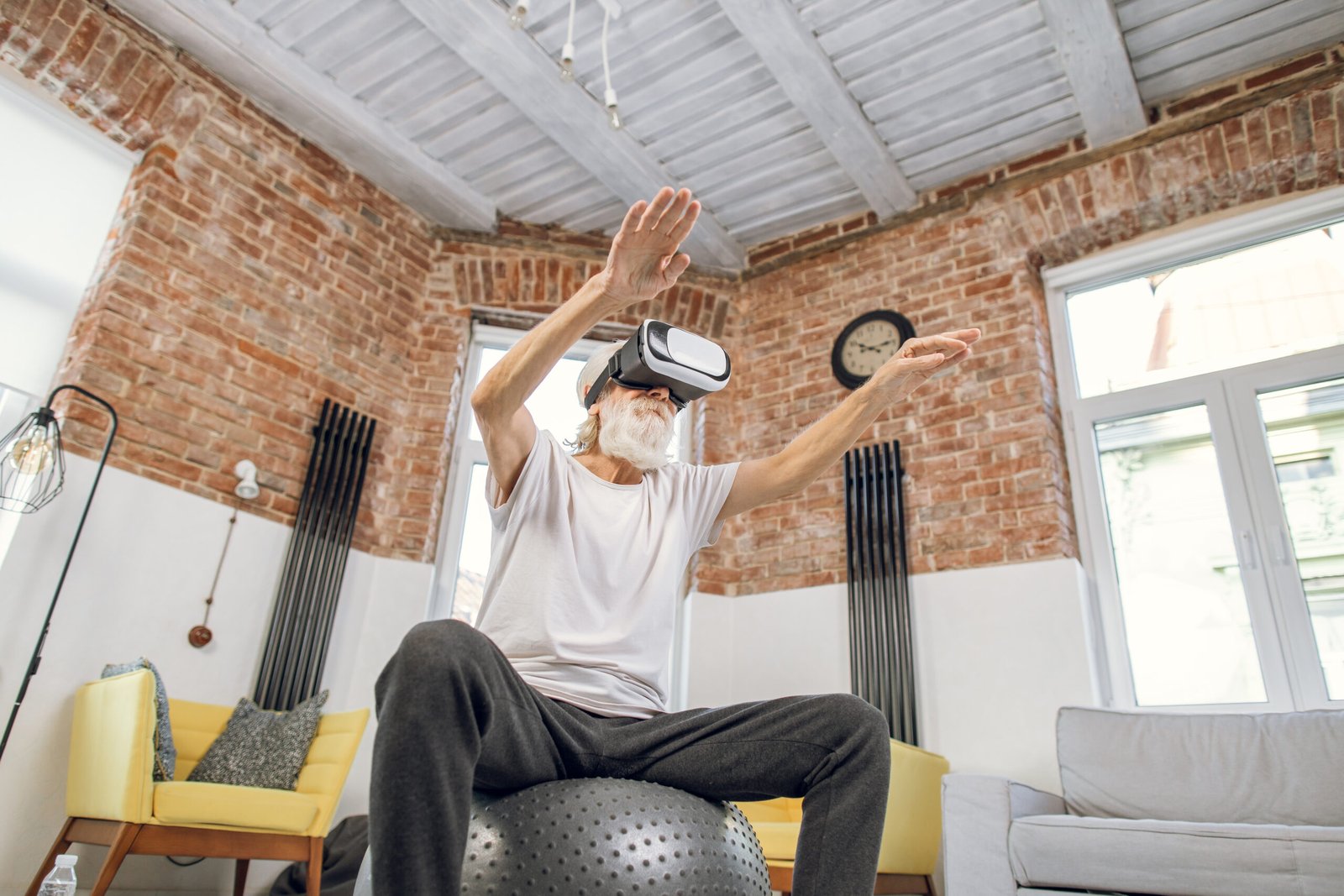Augmented and virtual reality for seniors are becoming significant aids in improving their well-being. In the care of older adults, AR and VR promote independence, cognitive stimulation, and socialisation.
VR allows patients to step out of their houses virtually while under seclusion, whereas AR assists them in enhancing day-to-day activities and cognitive functioning. Such innovations strive to create a better, more enjoyable environment for older adults. Their scope and possibilities in eldercare continue to expand.
Enhancing Mental Health and Reducing Loneliness
Loneliness and isolation adversely affect mental health among older persons. VR for senior mental well-being offers immersive travel, rekindling memories, and scenic escapes. Virtual social interactions are life-changing. Virtual meetings with family and friends make physical distance much less intimidating for seniors. Such gatherings help keep isolation at bay and build a sense of belonging to a community.
Engaging in virtual experiences and social presence through VR helps improve emotional and mental well-being by fostering social connections. VR in retirement homes can provide group activities and virtual outings, fostering a sense of community. Such technologies are powerful tools against the impacts of loneliness among seniors.
AR & VR in Elderly Care and Rehabilitation
VR for elderly rehabilitation revolutionises senior care. These environments make physical therapy exercises more engaging, enjoyable, and productive. VR enhances mobility and balance and reduces the risk of physical injury. AR in assisted living facilities offers cognitive stimulation through interactive games.
In a nutshell, VR-assisted therapy utilises real-life scenarios to promote recovery and aid in functional improvement. Such technologies allow older people to live independently while improving their quality of life. VR helps seniors gain confidence in performing daily activities, promote independence, and reduce caregiver dependency. AR provides visual cues as reminders to help increase safety during such tasks. Consequently, integrating such applications into individual care plans greatly boosts the results.
AR/VR for Dementia and Alzheimer’s Patients
Virtual reality for dementia patients offers therapeutic benefits. Immersive environments often recreate familiar settings to help trigger memories in these patients. Engaging in activities in virtual reality can stimulate cognitive function and reduce agitation.
VR therapy for seniors manages behavioural symptoms and improves mood. It offers a safe and sound environment with comforting and familiar controllable stimuli. Virtual reality helps to recall travel memories and lower agitation due to anxiety. This experience, besides providing cognitive engagement, also improves personal well-being.
Augmented reality is enough to provide visual cues and sensory inputs for tasks or orientation. Guided interactions in immersive spaces help patients understand and follow tasks more efficiently. This technology would be a source of comfort and valuable to the elderly suffering from dementia.
Augmented Reality in Everyday Life: Enabling Seniors with Real-Time Assistance
Whereas virtual reality immerses older adults in interactive settings, augmented reality for senior citizens brings technology to their daily lives—providing real-time support while keeping them grounded in the real world. AR applications assist seniors in navigating their environments, taking medication, and making simple tasks a breeze.
For instance, AR glasses can display step-by-step guidance in brewing tea, offer reminders to use medication or point to dangers in avoiding falls, thus making individuals safer and more independent at home.
In assisted living communities, engaging AR apps activate memory and cognition with visual puzzles and games projected into the user’s actual space. The technology can also assist communication for older adults with hearing or speech issues by offering text overlays or visual cues in real-time during dialogue.
As these technologies improve, AR will allow older adults to remain independent, enhance their well-being, and remain actively engaged with their surroundings.
like
Success Stories and Future Potential
As technology advances, AR and VR in elderly care will become more prevalent. The case studies demonstrate the positive impact of these technologies in retirement homes.
- Residents are encouraged to join virtual group activities, which boost mood and stimulate cognitive function.
- Customised VR experiences will address individual needs. AI models will adapt to cognitive changes and provide personalised support.
- Virtual social platforms will foster connections, and wearable AR will be a real-time assistance.
- AR glasses were introduced to help seniors with mild cognitive impairment receive real-time guidance during daily routines, such as preparing meals or navigating their living space.
Conclusion
AR and VR are revolutionising the care of older adults. Creating sophisticated software or apps can further enhance the functionality of smart robots. AR and VR can assist elderly people who live alone in maintaining their physical and mental health. VR for cognitive health in seniors create realistic experiences, ensuring more independence and well-being.
While VR provides intensely engaging experiences, AR has phenomenal potential for everyday functional assistance and cognitive reinforcement, particularly among seniors who might not easily acclimate to complete immersion. All in all, these technologies support each other in creating a kind, tech-facilitated care system.
P-XR AG supports companies in revolutionising healthcare with VR. We help Senior Citizens benefit from Virtual and Augmented Reality. Our expertise aligns continuously with customers’ changing needs to help you grow globally. For consultations, you can reach us at contact@p-xr.ch
